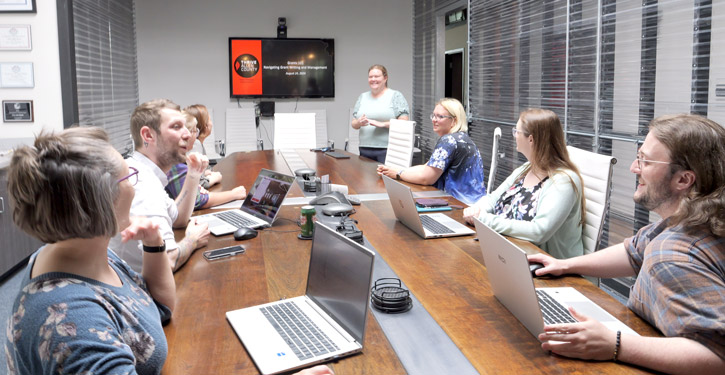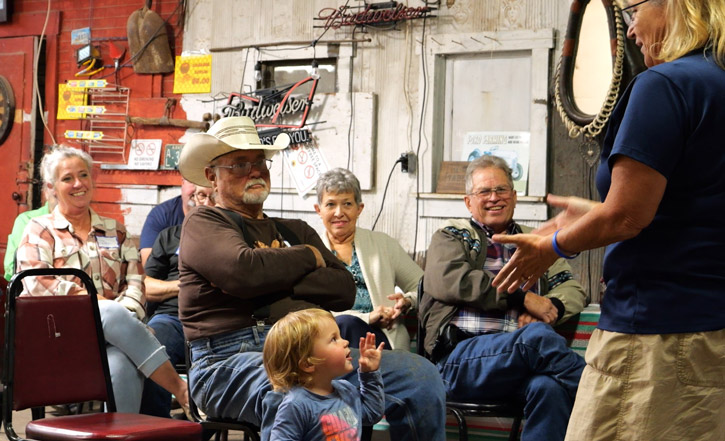May 15, 2024
Collaboration, Not Competition: Thrive Allen County's Capacity Building Initiatives
by Allee Mead
Rural organizations face many challenges in applying for grants, including few major foundations located in or familiar with rural areas and the perception that a smaller population area means a smaller impact. But one nonprofit in Kansas is showing just how mighty a rural organization can be. Since 2019, Thrive Allen County has brought over $28 million into the county for a wide variety of projects, including public transportation, grocery stores, hiking trails, and much more.
Two Thrive Allen County team members and a long-time supporter of the nonprofit share how the organization was able to build its own capacity and help other rural organizations and communities grow and thrive.
Growing through Funding
Thrive Allen County began in 2007, after the KU Work Group (now the University of Kansas Center for Community Health and Development) received a REACH Healthcare Foundation grant to study healthcare needs and community resources in Allen County, Kansas. Thrive Allen County evolved from the Allen County Health Advisory Committee and then received its own REACH grant for organizational development and capacity building.
In Thrive Allen County's early years, the executive director at the time decided to expand the organization's funding from local sources and start applying for state, regional, federal, and other funding sources. Expanding funding sources helped the nonprofit build capacity and avoid local budget cuts or changes in their early funding sources.

Lisse Regehr has been president and CEO of Thrive Allen County since 2019 but started working at the organization back in 2014 as a health insurance navigator and later in economic development, communications, and advocacy. She even took on grant writing duties for a brief stint before the nonprofit was able to hire a lead grant writer in 2019.
Jessica Thompson was hired in 2019 first as the director of development and is now the deputy director and the lead grant writer. In her first year, the organization had a staff of 8 and a budget of $600,000. Now, the organization employs 35 people and has a budget of $5 million. Thompson supervises four other grant writers. Since Thompson started, Thrive Allen County has brought in over $13 million to other entities in the county.
Thompson, who oversees all the 501(c)3 nonprofit's fundraising, said that 85% of Thrive Allen County's budget comes from grants from organizations such as REACH Healthcare Foundation, Health Forward Foundation, Sunflower Foundation, United Methodist Health Ministry Fund, the Centers for Medicare & Medicaid Services (CMS), Health Resources & Services Administration (HRSA), and state programs.

"When Jess started, we had about eight grants that we always went after," Regehr said, "but we weren't branching outside of this network that we were really familiar with. She really worked with the board and me to say, 'You are going to have to get used to the fact that we're going to go after funders we've never gone after before. We're going to be brand new to them and we will not have the same success rate that you are used to.'" The organization's previous success rate for grant writing had been over 80%.
Thompson said her team now has "about a 40% success rate when it comes to grant writing" and looks for grant opportunities all the time. According to its annual report, in 2023, Thrive Allen County applied for 60 grants and received 25 of them, a total of $4.9 million. For the larger community, the nonprofit applied for 16 grants and won 8, a total of $7.3 million.
"What's funny is although the average went down, the success went up and our organization and our capacity grew. Our work we were able to do within the community and the issues we were able to address grew," Regehr said.
Capacity Building Services for Others
In addition to its own capacity building efforts, Thrive Allen County provides free grant writing services, technical assistance, and strategic planning to any government or nonprofit entity in the county. For entities outside of Allen County, the nonprofit charges for these services. In addition, Thrive Allen County has a newsletter that lists upcoming grant opportunities for other entities, and Thompson provides Grants 101 trainings to other entities across the state.

Thrive Allen County's grant writers "usually bring in more money for the community than they do for the organization," Regehr said. The grant writing team helps governmental agencies and civic and nonprofit organizations apply for funding. "It's not just Thrive doing the work," she added. "We're also working to empower all of them to do the work as well."
In addition to Kansas, Thrive Allen County has worked with rural communities in California, Louisiana, Missouri, Nebraska, New York, Nebraska, and Oklahoma. "We are energized by working with other organizations in other communities," Regehr said. "It is not just people learning from us; it's us learning from them. There are so many cool things that are being done across the nation."
Thrive Allen County has even distributed funds to other organizations. During the COVID-19 pandemic, Thrive Allen County was asked by the county to distribute $2.4 million in SPARK funding, or Kansas's use of American Rescue Plan dollars. The money had to be spent in six months. Thrive Allen County met with people from different community sectors to create an advisory group and develop grant programs to distribute the money.
"For the first time ever, Thrive figured out: How do we write grant applications for people to apply to us instead of us applying for grants, how do we administer those, and how do we do it in a blind fashion, in a small rural community?" Regehr said. One strategy involved assigning a staff member to black out any identifying information on applications before other team members reviewed them.
We were trusted in a time when people were losing trust in a lot of things to do that work.
Regehr said, "I forever will be so proud of the way — at a time when so many people were scared and uncertain and just so afraid that their businesses were going to close and people were dying — that this team came together and said, 'We will hold strong and we will work the craziest of hours to ensure that this money goes [fairly] into our community'…We were trusted in a time when people were losing trust in a lot of things to do that work."
Building Trust in the Community
One way that Thrive Allen County has built trust over the years is by hosting "community conversations," in which Thrive team members visit every community in Allen County and learn what each community wants and needs. "They tell us what they think is going well, and they tell us what's not," Regehr said. "They tell us where they really need help and to be empowered and where they need resources."
Thrive Allen County has a community engagement director and a community engagement coordinator who follow up with communities after these conversations. In 2023, Thrive Allen County held 9 community conversations. Mildred, a town of 17 people, had 16 people attend the community conversation event.

Along with building trust, Thrive Allen County has learned to communicate with community partners about different projects. Regehr remembers a community member who thought Thrive Allen County was spending too much time on hiking trails and not enough time on other health issues. Regehr's boss at the time reminded her that this community member's opinion was valid and that "it's not either-or. It's both-and. And we just need to be able to talk with them about how it's both-and. And just because we work on this one thing doesn't mean we won't also address these other things."
The average community member also might not understand how grant funding works or that grants designed for one project can't be used for another project. In addition to being transparent with the public, Regehr has learned it's important to bring community members in on decision-making and give them space to share complaints and concerns. "At the end of the day, we all want what's best for the community," she said.
Accomplishments
Thrive Allen County has a group called the Rural Health Initiative (RHI), which had been working on providing public and safety net transportation in the area. Thompson heard about a grant from the National Center for Mobility Management and told RHI that they should apply for it, even though they most likely would not receive the grant.
"No community our size had ever received it," Regehr said. "The next meeting, she's like, 'Yeah, so that grant that I told you we weren't going to get, we got it, so we've got to do a lot of work and you guys all signed on to be a part of it.'"
"It was my first week and it was the first grant that I wrote for," Thompson said.
That grant allowed Allen County to temporarily provide public transportation and for RHI to create Allen Regional Transit for when the county program ended. The experience helped Thrive Allen County learn an important lesson: "Keep throwing those darts at the wall because if you don't throw them, you're not going to hit anything. If you do, you eventually will. And holy cow, Jess hit it on the first go-round," Regehr said.
Thrive Allen County also created a partnership with local governments and the industrial development organization Iola Industries, Inc. to pay for the contract of an economic development manager. "In a rural community, you really can't just have economic development without also looking at health and wellness," Regehr said. "You can't have community development without the economic and the health and wellness part. When we talk about the whole health of our community, we're talking about physical, fiscal, social, emotional."

Mary Kay Heard, retailer and chairman of the board of Iola Industries, Inc., is a long-time supporter of Thrive Allen County. "Thrive has taught us to think bigger as a town and a county," Heard said. "We each have special assets and talents to share, and Thrive taught us to talk to each other more and — more importantly — to listen to each other."
Regehr, who also serves as one of the Iola Industries, Inc. directors, said the Thrive Allen County board members have expressed surprise at how much the nonprofit has accomplished: "One of the things they talk about is Thrive is so much more than we ever thought it would be. They founded us as a health and wellness organization. They thought maybe we'll have five team members. They are blown away by what we're doing today."
Thrive Allen County Highlights
- Winner of the 2017 Robert Wood Johnson Foundation Culture of Health Prize
- Over 60 miles of new hiking and biking trails and a new state park
- New grocery store for Iola and a grocery store-turned-food cooperative for Moran
- County's uninsurance rate dropping from 21% in 2013 to 9% in 2018
- 5,540 rides provided in 2023 by Allen Regional Transit
Challenges and Lessons Learned
Thompson said one challenge has been weathering the changes in capacity. For example, in one year the organization doubled in size. Thompson added that the culture of an organization changes with the size; for example, a team of 8 people has a different culture than a team of 35.
As an organization that relies on grant funding, Thompson and Regehr have worried about maintaining enough funding to keep team members staffed in the positions where they were hired, instead of being moved to another area when the funding changes. "We are constantly looking to the future for funding that will allow our team members to continue their work or branch out in other areas they are passionate about where our community has a need," Regehr said.

Even with the success they've experienced, they are still a rural nonprofit, Thompson said, without the same resources, access, and visibility as an urban nonprofit. She added, "There are grants that we could go after that we don't have the capacity to go after right now, because they're either too big and complicated or they're just too time-consuming."
Despite those challenges, Thompson stressed that organizations need to take risks: "We're not afraid to go after grants that we've never gone after before. We're not afraid to build relationships with entities that we've never had relationships with before."
Even hiring was an area in which the nonprofit has taken risks. Thompson explained that she is the only member of her grant writing team who had grant writing experience prior to joining Thrive Allen County. Everyone else was hired for their strong writing skills and then taught how to write grants. Employees have come from all over the country to live and work in Allen County.
The trust that we've built with our partners and our funders have allowed us to fail and to experiment.
"The trust that we've built with our partners and our funders have allowed us to fail and to experiment," Thompson said, "because without those trusted relationships, we wouldn't be able to push those boundaries and try new and different things."
Regehr stressed the importance of working together — not just different organizations, but different communities. "It's not competition. It's collaboration," she said. "I think too many small communities look at the community next door or the nonprofit next door and they say, 'That's my competition.' It's not…Communities work better if the organizations and the municipalities and the counties are collaborating, not competing."

